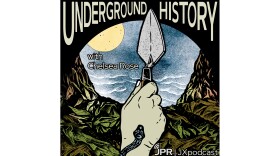-
Corky Lee's Asian America: Fifty Years of Photographic Justice. Columbia University history professor Mae Ngai, is one of the book's editors.
-
Lynn Barton talks about her political transformation, in the context of other women voters.
-
Tribal Histories of the Willamette Valley, Oregon Indigenous historian David G. Lewis highlights Native perspectives about the region.
-
Mike Green from Common Ground Conversations in Medford has been exploring why white and Black women voters often take opposite votes on candidates and issues, despite sharing some very important values.
-
A new campaign aims to spread awareness of Oregon's Bias Response hotline
-
Barbara Hilyer's journey of discovery up a family tree she never knew is described in her book Legacy Lost: Passing Across the Color Line.
-
Nikki Payne rewrites Sense and Sensibilities in the 21st Century
-
Brooke Ellison died this month. An interview with her last year about her memoir.
-
The Pit River Nation is seeking protective status for Medicine Lake Highlands. Brandy McDaniels, Monument Lead for the Pit River Nation, and Michelle Berditschevsky at the Mount Shasta Bioregional Ecology Center.
-
Klamath Falls archeologist Dan Broockmann, and Ken Sandusky of the Modoc Tribe talk about efforts to "image" archaeological sites, so that Modoc Nation members in Oklahoma can "experience" their ancestral homelands.
-
Oregon State Archaeologist John Pouley. He lays out the laws and suggestions guiding archaeological exploration of Oregon's long-ago past.
-
Chief Caleen Sisk of the Winnemem Wintu about the 2023 symbolic Sacramento River Fish Run.
-
A series of essays by indigenous leaders, many of them women, in the book Invisible No More: Voices from Native America.Steve Dubb, the book's co-editor (with Raymond Foxworth), and from contributing writer Hillary Renick.
-
Julie Oliveira and Rosemary Deck, Yurok Tribe investigators, about ongoing search for missing and murdered native women.















